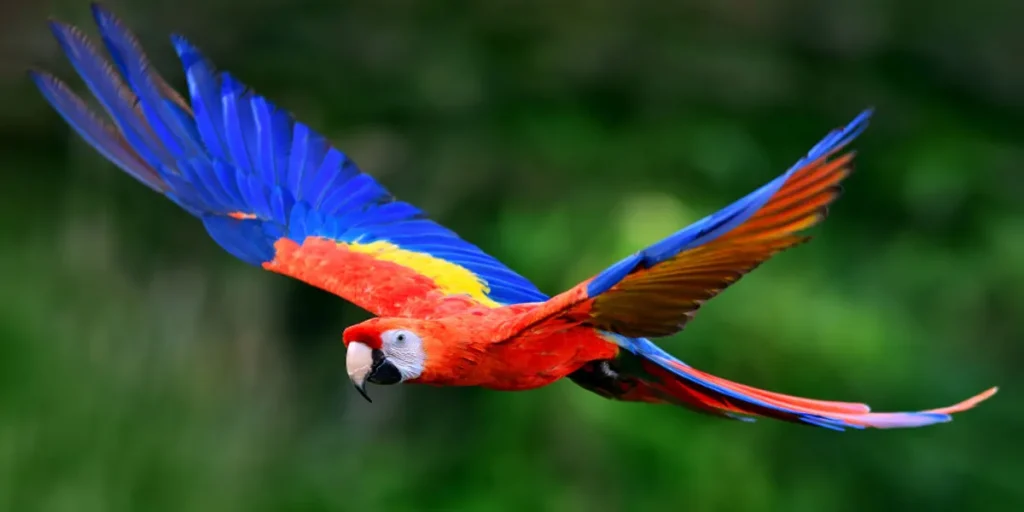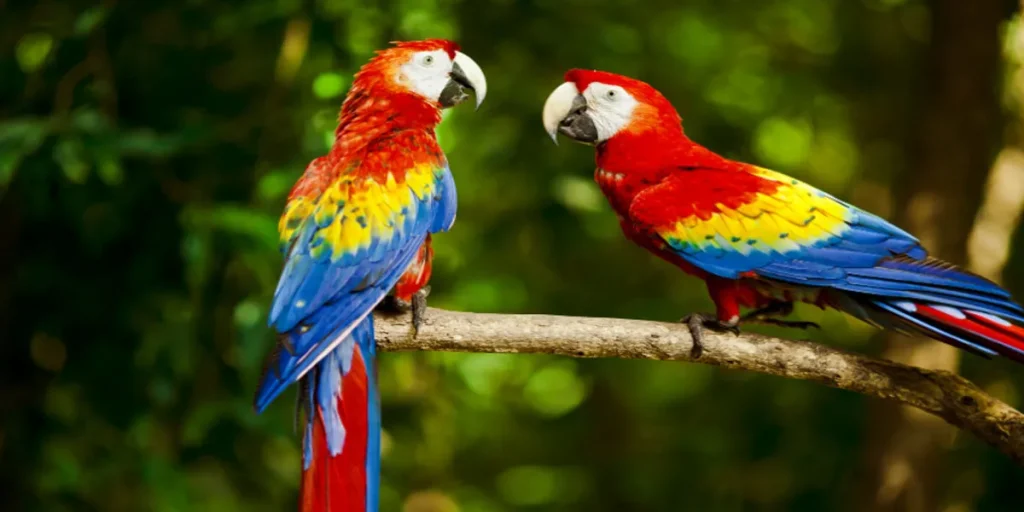A Macaw typically weighs between 900 grams to 2 kilograms. This weight range varies among different macaw species.
Macaws, the vibrant jewels of the parrot family, mesmerize bird enthusiasts with their striking colors and impressive size.
Known for their long tails and large beaks, macaws are a favored subject for bird watchers and potential pet owners alike.
With their weight as a key factor in their care, understanding the specific needs of these majestic birds is crucial for their wellbeing.
As a part of the larger parrot species, macaws share many characteristics with their relatives, yet their size and weight set them apart, impacting everything from their diet to their habitat requirements.
Whether observed in the wild or cared for in homes, these birds are a fascination that continues to captivate people around the globe.
Macaw Weight Variations

A macaw’s weight is a fascinating aspect of its biology. These vibrant birds vary in size and weight.
From the petite Hahn’s macaw to the majestic Hyacinth macaw, each species flaunts its unique weight range.
Factors Influencing Weight
Several factors play a pivotal role in the weight of a macaw:
- Age: Young macaws weigh less.
- Diet: Nourishment impacts overall health and weight.
- Activity Level: More active birds may weigh less.
- Genetics: Some macaws are naturally larger or smaller.
Comparison By Species
Macaw species display a remarkable diversity in weight:
| Species | Average Weight |
|---|---|
| Hahn’s Macaw | 165g |
| Blue and Gold Macaw | 900-1500g |
| Scarlet Macaw | 900-1400g |
| Green-wing Macaw | 1250-1700g |
| Hyacinth Macaw | 1200-1700g |
The table above presents the average weight range for different macaw species.
Surprising Feather Facts

Welcome to a world where feathers aren’t just for show; they’re marvels of nature’s engineering.
Macaws are known for their impressive size and exuberant colors which conceal incredible adaptations.
How much does a macaw weigh? On average, a macaw’s weight varies dramatically. Variables like age, diet, and species affect weight.
Small macaw species may weigh a mere 0.5 pounds, while larger ones can tip the scales at up to 3.75 pounds.
Adaptations For Flight
- Lightweight skeletons: Macaws have hollow bones, reducing weight for effortless flight.
- Powerful muscles: Strong chest muscles empower them to flap their large wings and stay airborne.
- Streamlined feathers: Smooth, overlapping feathers reduce drag and enable dynamic soaring.
The interplay of a macaw’s weight and its feather structure is a testament to its aerial prowess. Even their tail feathers play a role, acting as a rudder for direction.
Vibrant Colors And Camouflage
- Bright plumage: Vivid blues, reds, and yellows make macaws a spectacle against the green rainforest backdrop.
- Color variety: Each feather varies in pigmentation, contributing to the rainbow-like effect.
- Hidden in plain sight: Despite their colors, macaws blend into the foliage when at rest, helped by the shadowy forest light.
The color of a macaw’s feathers is not just for beauty. It serves as both a mate attractor and a predator deterrent.
| Species | Weight (pounds) |
|---|---|
| Hyacinth Macaw | 2.6 – 3.75 |
| Scarlet Macaw | 2.2 – 2.7 |
| Blue and Gold Macaw | 2.0 – 3.3 |
| Green-winged Macaw | 2.5 – 3.7 |
| Red-shouldered Macaw | 0.5 – 0.7 |
Diet And Nutrition’s Impact
The weight of a macaw can vary greatly among species and individual birds. It is crucial to provide a balanced diet to ensure a healthy weight.
The right mix of nutrients contributes to a robust immune system, bright feathers, and overall vitality.
Foods For Healthy Weight
A well-rounded diet for macaws includes:
- Fruits: Offer variety like apples, bananas, and berries.
- Vegetables: Leafy greens and carrots are excellent.
- Nuts: Almonds and walnuts provide healthy fats.
- Pellets: Ensure they are specific for macaws.
Macaws also enjoy cooked grains such as rice and quinoa. Fresh water should always be available.
Risks Of Malnutrition
Malnutrition in macaws can lead to:
- Feather plucking and dull colors
- Lethargy and weakness
- Increased susceptibility to diseases
Regular vet checkups can spot early signs of poor nutrition. Careful monitoring of diet ensures a healthy, happy macaw.
Life In The Wild Vs Captivity
The weight of a macaw can vary depending on their environment. Macaws in the wild live differently than those in captivity. Let’s explore how their habitat affects their weight.
Natural Habitat Influence
Macaws flying free in their natural habitat experience diverse diets. They eat fruits, nuts, and seeds found in rainforests.
This natural diet keeps them fit. Exercise from flying across vast areas also maintains their weight. Wild macaws usually weigh less, as they are highly active.
- Fruits and seeds provide nutrition.
- Constant flying offers exercise.
- A varied diet ensures healthy weight.
Captivity Challenges And Weight
In captivity, macaws face different challenges. Their diet is often less diverse. Limited space can restrict their flying.
Owners must be careful not to overfeed them. Macaws in homes may weigh more than their wild counterparts.
| Aspect | Wild | Captivity |
|---|---|---|
| Diet variety | High | Low to Moderate |
| Exercise | Plenty | Limited |
| Weight | Lower | Higher |
Providing a balanced diet and regular exercise is key in captivity. This ensures macaws stay healthy and don’t become overweight.
Conservation And Health Monitoring
The majestic macaws, known for their vibrant plumage and intelligence, also require dedicated conservation efforts.
Understanding the weight of a macaw is crucial for both their health monitoring and conservation.
This engaging guide provides insights into why tracking their weight and overall health is vital for ensuring their future.
Threats To Macaw Populations
Macaws face several threats that jeopardize their populations:
- Habitat Loss: Expanding human activities reduce their natural habitats.
- Poaching: Illegal trapping for the pet trade affects their numbers.
- Environmental Changes: Climate change introduces new challenges to their survival.
Protecting these birds necessitates a clear understanding of these threats and proactive measures to mitigate them.
Importance Of Regular Check-ups
Consistent health check-ups play a pivotal role in the longevity of macaws. They help detect:
- Early signs of disease or malnutrition.
- Issues related to weight gain or loss.
- Other health-related abnormalities or stress.
Regular veterinary checks ensure any concerns are addressed promptly, promoting healthier lives for these beautiful creatures.
Veterinarians typically weigh macaws during check-ups, providing valuable data for individual and species health assessments. A healthy weight range for macaws varies:
Table showing different macaw weights
| Macaw Species | Average Weight |
|---|---|
| Hyacinth Macaw | 1250g – 1700g |
| Blue and Gold Macaw | 900g – 1500g |
| Scarlet Macaw | 900g – 1000g |
Attentive care and monitoring can help ensure macaws thrive both in captivity and the wild.
FAQ About the Weight of a Macaw
What Is The Average Weight Of A Macaw?
The average weight of a Macaw ranges from 900 grams to 2 kilograms.
Different species have varying weights, with large macaws being heavier.
Can Macaw Weight Vary By Species?
Yes, Macaw weight can significantly vary by species.
Smaller macaws like the Hahn’s macaw may weigh about 165 grams, whereas larger ones like the Hyacinth can reach up to 1. 7 kilograms.
Why Is Knowing A Macaw’s Weight Important?
Knowing a Macaw’s weight is crucial for health monitoring. It aids in adjusting diet, detecting illnesses early, and ensures overall well-being.
How To Weigh A Macaw Correctly?
To weigh a Macaw, use a bird-friendly scale. Ensure the Macaw is calm and the scale zeroes out before recording the weight for accuracy.
Conclusion
Understanding the diverse weight range of macaws is key for potential owners and bird enthusiasts.
With species tipping the scales from a petite 0. 2 kg to a hefty 1. 5 kg, these vibrant birds showcase a broad spectrum of sizes.
Remember, a healthy macaw’s weight is a pivotal aspect of its overall well-being. Caretakers must ensure a balanced diet and regular check-ups to maintain an ideal weight, allowing these magnificent creatures to soar in health and happiness.
Resources:
https://www.fws.gov/species/scarlet-macaw-ara-macao-cyanopterus
https://www.idahofallsidaho.gov/DocumentCenter/View/5017/Scarlet-Macaw
